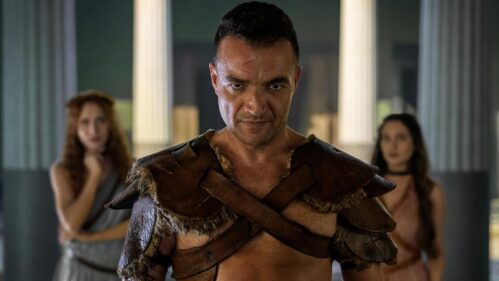One has to admire the audacity of creators Scott Frank and Tom Fontana—imagine picking up the mantle of Sam Spade, the prototypical hard-boiled detective made famous by Dashiell Hammett’s cynical, lyrical crime novels and a once-in-a-lifetime performance from Humphrey Bogart, and retooling him not just for a new age, but a new medium: prestige television. Lucky for us, then, that the minds behind “The Queen’s Gambit” and “Oz” know their way around a screenplay and a camera and have picked the right man to pick up Bogey’s mantle: “Monsieur Spade,” a six-part miniseries starring Clive Owen as the legendary private eye, is an early contender for one of the best series of the year.
Rather than re-adapt “The Maltese Falcon” or any of the smattering of short stories Hammett wrote featuring the character (as literary legacies go, Spade’s was surprisingly short), Frank and Fontana, with the help of executive producer Barry Levinson, create a wholly original tale of the legendary gumshoe.
No longer in his prime, or in San Francisco, “Monsieur Spade” places Sam in 1963 France, living out a comfortable retirement in the small village of Bozouls. Long past his glory days, he’s holed up in the palatial home of his late wife, Gabrielle (Chiara Mastroianni, daughter of Marcello Mastroianni and Catherine Deneuve), who left him the estate after she passed before the events of the show. He spends his hours smoking, swimming nude in the pool and letting the estate’s winery go to seed. And that first one is catching up to him, as old Father Time often does: He learns in the first episode that he’s developed emphysema; still, good luck prying that cigarette out of his cool, sardonic hands.
But his past, both as a man and a detective, catch up with him when he learns that an old nemesis of his named Philippe Saint-Andre (Jonathan Zaccai) is back in town; combine that with the brutal murder of six nuns at the nearby church, and old Sam Spade ends up back on the case.

Frank and Fontana craft a clever, elegant script that echoes the rhythms of Hammett without feeling like a pale imitation—especially when it comes to filling Spade’s mouth with withering, literary dialogue. (“You sound like a leaflet someone dropped from a plane,” he cracks at a young revolutionary late in the series.) Frank, who also directs, makes beautiful use of the pastoral French setting, using the trees and plains of the countryside for moments of alternating serenity and savagery.
Over six taut, riveting episodes, we see the layers of the mystery unfurl in asymmetrical ways as Philippe’s reappearance and the murder of the nuns open up a grander search for a young boy whose mysterious abilities could spell the end of the world (or its salvation, depending on which interested party you ask). In a month that also sees another great season of “True Detective,” it’s fitting that this year gifts us another murder mystery that borders on the fantastical.
As the show’s scope expands, so does its cast of colorful characters, each of which challenges Sam in new and interesting angles. There’s Teresa (Cara Bossom), the 15-year-old he’s been tasked to protect, who discovers her own capacity for investigation; Patrice Michaud (Denis Ménochet), the cynical chief of police who acts as a kind of Lestrade figure for Sam; the pair of eccentric and highly suspicious Brits (Matthew Beard and Rebecca Root) who move in next door; and a PTSD-riddled war vet (Stanley Weber) with a connection to the boy. That’s to say nothing of the various political and religious forces who come down on Bozouls by the final episode, featuring some surprising cameos that raise the show’s wow factor considerably.

It all leans on Owen at the end of the day, a movie star who never really got the accolades he deserved in his prime. In the 2000s, he was unstoppable, with his chiseled jaw and gritted teeth; he could have been James Bond had he not turned down the opportunity to pursue other roles. But it always felt like 2007’s “Shoot ‘Em Up,” a crackerjack action-comedy whose overt cartoonishness was far ahead of its time, bumped his star down a few pegs, and he never really recovered from that. “Monsieur Spade” works as a redemption for both Spade and Owen: older, wizened, but no less sharp or powerful. More than the inescapable glimpses of Bogey, he infuses his take on Spade with the steely-eyed intensity of Clint Eastwood and the laidback charisma of William Hurt. He can deliver a dry bon mot as gracefully as a haymaker, and that effortlessness is key to what makes Monsieur Spade so compelling, and so tragic.
There’s a maturity to “Monsieur Spade”’s loping rhythms and casual wit that feels so refreshing in an age where so many series refuse to treat their audience like grownups. In Frank and Fontana’s hands, Sam Spade becomes a figure of high tragedy—a man convinced his best days are behind him, who nonetheless searches for purpose in a world increasingly devoid of it. That extends to his European setting, both a place for droll fish-out-of-water comedy (Spade’s murky French fluency becomes both a strategic tool and an opening for ridicule) and a way to explore the scar tissue World War II and the Algerian War left on the soul of the nation.
“Monsieur Spade” is a surprisingly philosophical reinvention of one of literature’s most recognizable figures, told with care and passion. I hope it gets enough attention to guarantee at least one more job for France’s newest, oldest detective.
Whole season screened for review. Premieres on AMC on January 14th.












